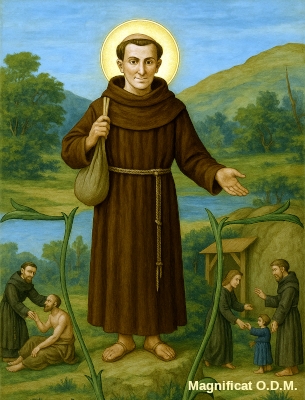Lives of the Saints
Our Models and Protectors
Spiritual Bouquet:
December 15

Blessed John the Discalced
Franciscan Friar
(1280-1349)
Blessed John the Discalced was born near Quimper in France. In his youth he was a laborer; he made and erected crosses, built bridges and arches. Works useful for the glory of God or the welfare of his neighbor were the ones most agreeable to him. However, God was calling him higher, and by perseverance he succeeded in studying to receive the priesthood, despite the opposition and mockery of an artisan from whom he had learned his trade, one of his relatives.
From that moment on his life was very austere; he fasted three times a week on bread and water, visited the poor and the sick, and became the object of universal veneration. For thirteen years he served as a parish priest in his diocese, and never did he take a horse for his parish visits, but walked barefoot; hence his name, the Discalced or unshod. His very frugal life might have permitted him to set money aside, but the indigent received all that was not strictly necessary for him, and sometimes that as well.
The holy priest then entered the Order of Saint Francis. In the monastery at Quimper, Brother John was soon recognized to be the most humble and most mortified of all. The spirit of poverty made him choose the most worn habits, which he repaired himself. Since he had nothing to give away, he begged from the wealthy and thus assisted the miserable. He rose every night before the others, and very often spent entire nights in the charms of mental prayer.
The devil sometimes waged a fierce war on him, but the holy religious, trusting in God, manifested his contempt for the tempter, calling him dog, and driving him away by words of distress and supplication from the Psalms. His mortification was extreme; he fasted unceasingly on bread and water save for forty days during the year, and for sixteen years touched no meat or wine. He had the gift of tears in his ministry of confession, and the spirit of prophecy which revealed to him future public chastisements. He foresaw and announced the siege and capture of Quimper before the intention had been formed in the mind of the assailants. Great cruelties accompanied it, and a famine followed.
He also foresaw the pestilence which would afflict it in 1349, and wept. When the other religious asked him what was wrong, he told them only that the city would be afflicted again with a new calamity. He devoted himself to serving the plague-stricken, offered his life to God in sacrifice, and died of the terrible scourge in that year, at the age of sixty-nine. The city remains devoted to his memory, and his statue is in its cathedral.
Vie des Saints pour tous les jours de l'année, by Abbé L. Jaud (Mame: Tours, 1950); Les Petits Bollandistes: Vies des Saints, by Msgr. Paul Guérin (Bloud et Barral: Paris, 1882), Vol. 14